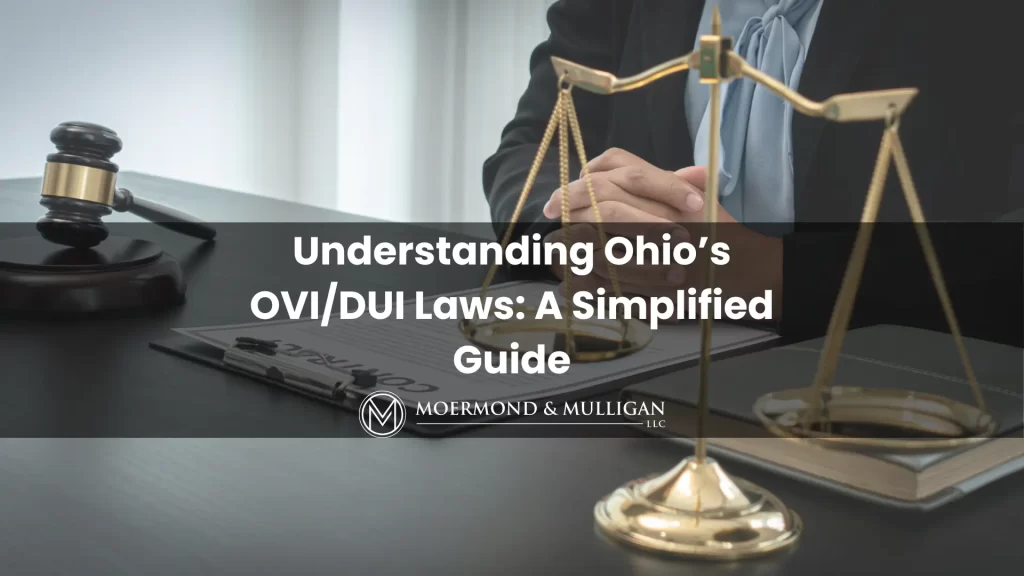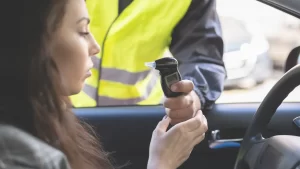Posted on Friday, July 28th, 2023 at 8:46 pm

In Ohio, like in every other state, it is illegal to drive a vehicle while intoxicated by drugs or alcohol. Many states call it DUI, but Ohio labels this offense as Operating a Vehicle Impaired, or OVI. This simplified guide will define Ohio’s OVI/DUI Laws, including what OVI is, explain Blood Alcohol Content (BAC) limits for various types of drivers, and review the state’s Implied Consent laws. It will then provide an overview of penalties and, finally, outline some potential defenses. The attorneys from Moermond & Mulligan, LLC break down the laws of an OVI/DUI in Ohio below.
Definition of OVI/DUI in Ohio
The Ohio OVI statutes are found in Section 4511.19 of the Ohio Revised Code, which defines the crime as the operation of any vehicle – including motor vehicles, watercraft, and aircraft – while under the influence of alcohol, a drug of abuse, or a combination of them. Ohio law makes it an offense to operate a vehicle with a blood alcohol concentration (BAC) of 0.08% or higher, regardless of whether the individual’s driving ability was actually impaired. This is known as a “per se” OVI.
Under Ohio law, a driver operates a vehicle under an “impaired” OVI if alcohol, drugs, or a combination of both substantially impair them. Authorities gauge impairment by behavior, appearance, sobriety test results, and other factors, regardless of BAC.
BAC Limits for Different Drivers
In Ohio, like most states, BAC legal limits vary by driver’s age and vehicle type. It’s crucial to know these limits as exceeding them can result in a per se OVI offense.
- Most Drivers (Those 21 years and older): For ordinary drivers who are 21 years of age or older, the legal BAC limit is 0.08%. Any measurement at or above this limit is grounds for an OVI charge.
- Commercial Vehicle Drivers: For those operating commercial vehicles, the BAC limit is lower. The state of Ohio, in line with federal regulations, sets this limit at 0.04%.
- Underage Drivers (Those below 21 years): The state of Ohio has a zero-tolerance policy for unda skilled attorney can employ to challenge the chargeerage drinking and driving. please rewrite this sentence in less than 20 words:
Please keep in mind that these BAC limits establish the threshold for charging you with a per se OVI. Even with a low BAC, signs of impairment can lead to an OVI charge.
Ohio’s Implied Consent Laws
When you drive a vehicle in Ohio, you automatically give your implied consent to undergo chemical tests if you are pulled over by law enforcement on suspicion of OVI/DUI. Consent to test your BAC or drug presence is a driving condition, covering breath, blood, and urine tests.
your implied consent to undergo chemical tests if you are pulled over by law enforcement on suspicion of OVI/DUI. Consent to test your BAC or drug presence is a driving condition, covering breath, blood, and urine tests.
If lawfully arrested with probable cause for suspected impaired driving, an officer can administer a chemical test. While refusal to submit to a test is your right, it comes with immediate consequences under Ohio’s implied consent laws. Refusing a chemical test after a suspected OVI/DUI results in immediate license suspension. The administrative license suspension operates independently of any court-imposed penalties you might receive upon an OVI/DUI conviction.
Overview of Penalties
Ohio’s OVI/DUI penalties are determined by factors such as the driver’s BAC level, the presence of any injuries or fatalities, and the driver’s past OVI/DUI history. A first-time offender can face between 3 days to 6 months in jail, fines up to $1,075, and a license suspension up to 3 years. A second offense within 10 years may result in a year’s jail, increased fines, and extended license suspension. A third offense within the same period results in even steeper penalties. With aggravating factors like high BAC, minors onboard, or causing accidents, penalties can be significantly harsher.
How to Fight a DUI/OVI Charge
Facing a DUI/OVI charge doesn’t inherently result in a conviction. There are avenues for a vigorous legal defense that a skilled attorney can employ to challenge the charge, such as:
- Challenging the Lawfulness of the Traffic Stop
- Questioning the Accuracy of Field Sobriety Tests
- Contesting the Chemical Test Results
Remember, while these defenses can be useful, it’s important to consult with an attorney experienced in OVI/DUI defense. Our attorneys are experts in Ohio’s OVI/DUI laws and will consult with you to explore the best approach for your specific situation. Contact Moermond & Mulligan, LLC today for a free case review.
Related Posts:
Written By: Moermond & Mulligan, LLC
Last Updated: 02-11-2025